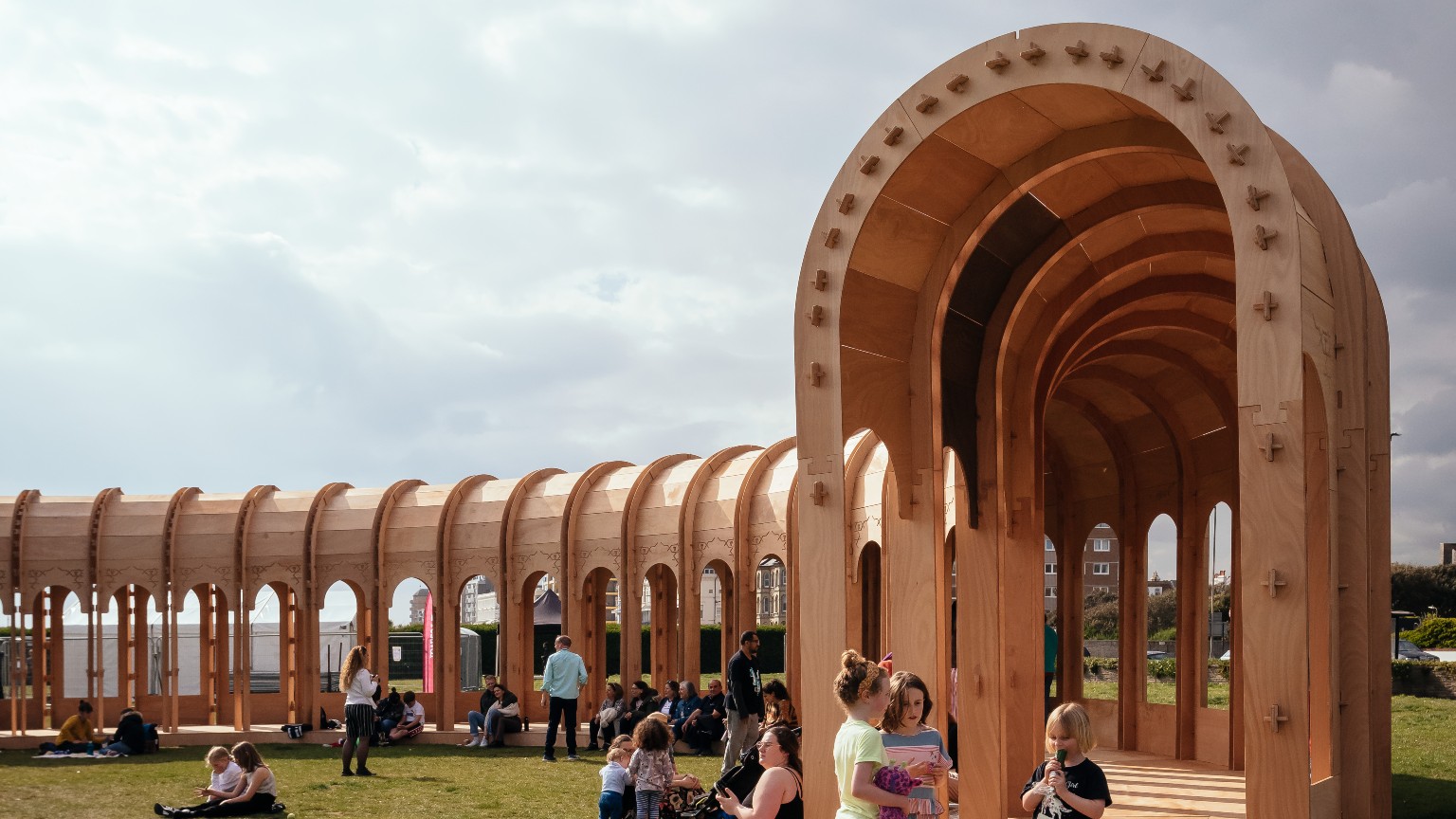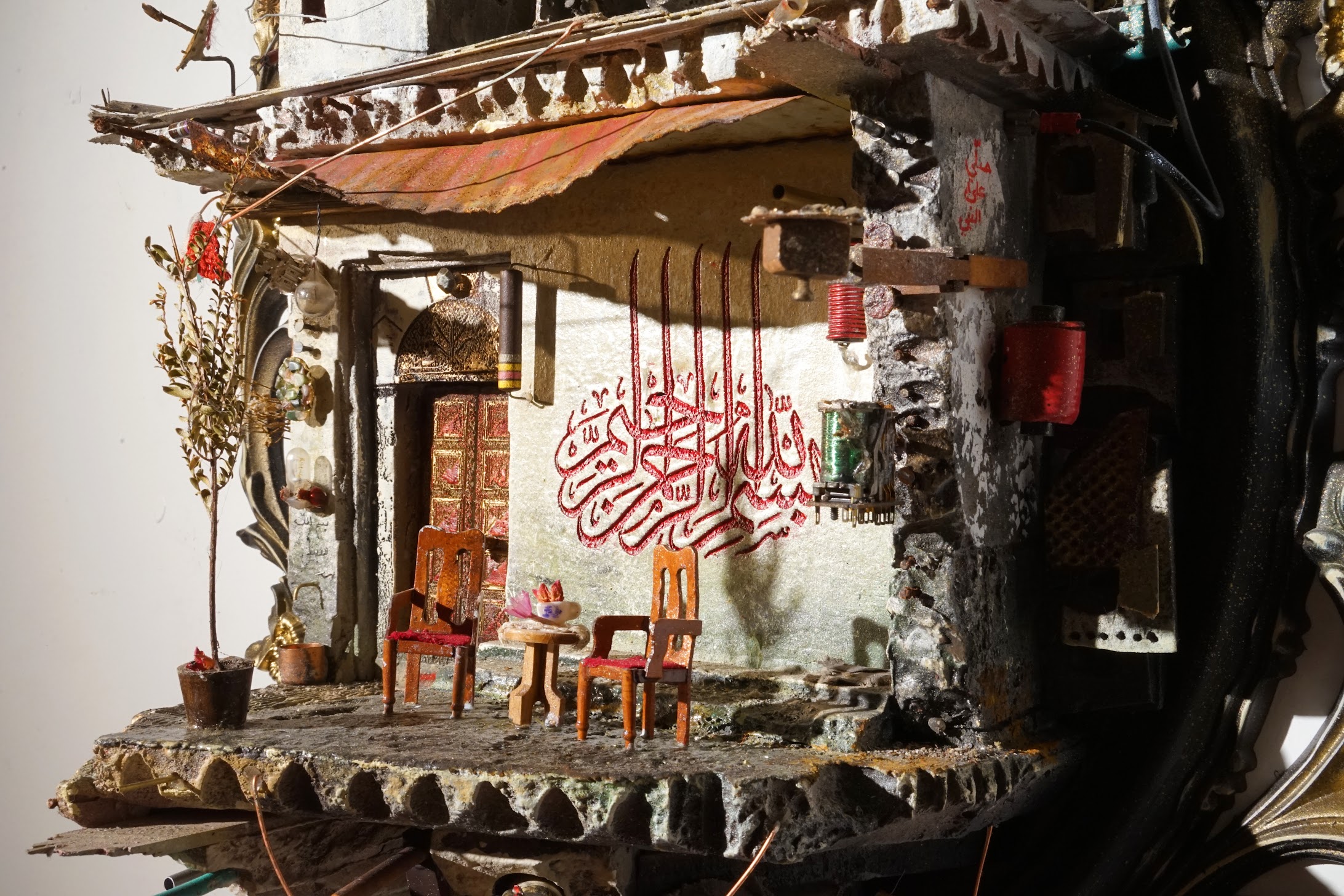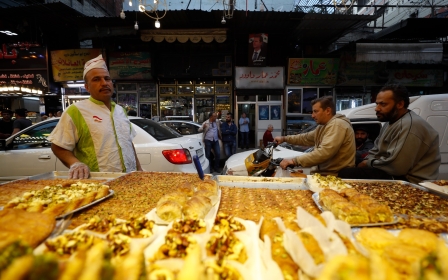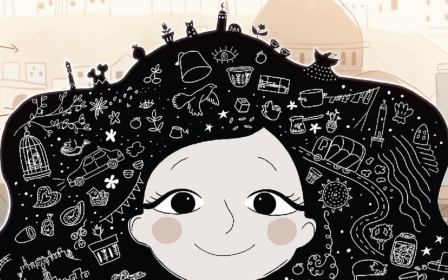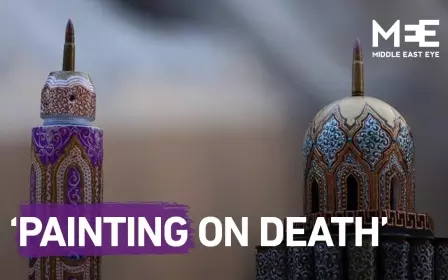Marwa al-Sabouni on war, urban breakdown and directing the Brighton Festival
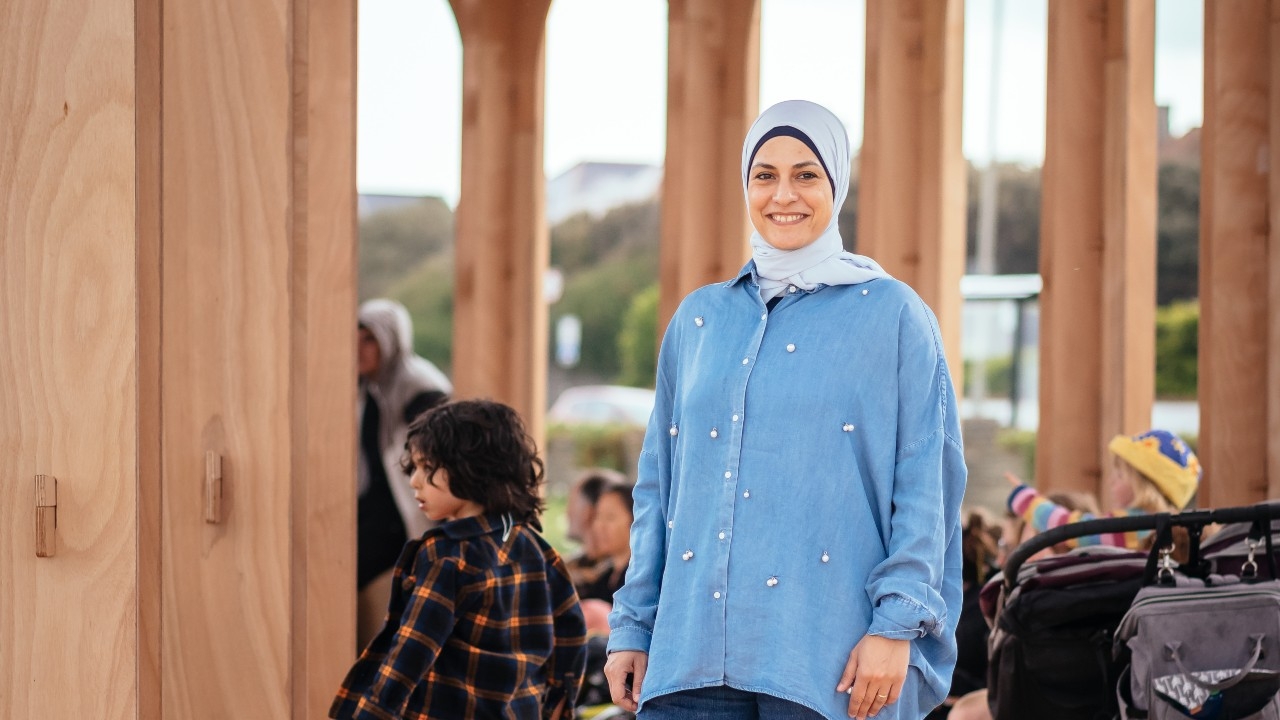
On Hove seafront on the UK’s south coast a new construction has appeared as part of the annual Brighton Festival.
The Riwaq - a curved semi-enclosed portico or arcade carved from wood - faces a stage where two Arab musicians are performing classic Syrian folk songs. Audience members sit on the inner edge of the riwaq, some singing along and others rising to their feet to dance a dabka.
This year, Marwa al-Sabouni, a Syrian architect and author from Homs, is co-director of the festival. It's the culmination of four years of conversations, delayed by the Covid-19 pandemic - and the riwaq was her studio’s design.
“As a semi-enclosed space, it’s part of the architectural vocabulary [of Syria] - it’s there in courtyard houses, in colleges, in old universities, even in Europe you see the colonnade,” she tells Middle East Eye at her hotel in Brighton.
Alongside co-director Tristan Sharps, Sabouni, who is slight and intense with an infectious smile, has brought a Syrian infusion to the festival, which runs through 29 May.
With Sharps, she says she wanted to focus on the theme of rebuilding, and together they handpicked a selection of artists, eventually shaping the programme to match.
Drawing lessons from war
Sabouni made her name outside Syria with her 2016 book The Battle for Home, which combined her views on Islamic and modern architecture and the role recent, unbalanced development played in the conflict in Syria, with her own personal experiences of the war.
The positive reception the book received led to her travelling to give talks in the UK and Europe, including a TED talk and lecture at Oxford University.
Her book was written at the height of the war in Syria, where her hometown, Homs, was the ground zero of destruction from 2011 to 2014. At the time, Sabouni was studying for a PhD and had to walk to the university under the threat of snipers and mortar fire.
Her husband, also an architect, was stopped at a government checkpoint and taken away at the beginning of the uprising in 2011, simply because his ID said he was from Baba Amr, the Turkmen area of Homs, known for rebel militancy.
Like countless others, Sabouni and her husband's family had no idea of his whereabouts and frantically tried to locate him.
“He was taken for three days. Some people were gone forever unfortunately, and some people suffered massively,” she says.
Following the completion of her PhD, which she describes as an epic struggle against petty university bureaucracy that ended with her triumph against the odds, came the idea for the book.
“I used Homs as an example in cities not only in Syria, not only in the region, but also globally - not necessarily in the same intensity as we had, but they followed similar transformations, similar patterns.
“That’s why it’s important we draw lessons from what’s happening in Syria because that ended in conflict and war. But all over the world we see division, we see subtle conflicts, we see these kind of segregated cities, we see the collapse of society, we see the tensions between different people."
She adds: “You would think that modern cities like London or Dubai have no problems of segregation - which is completely not true. It’s segregated but it doesn’t show.”
'You would think that modern cities like London or Dubai have no problems of segregation - which is completely not true'
- Marwa al-Sabouni, architect
One solution, explored in her new book Building for Hope, is to revive the concept of the waqf - a form of Islamic trust that was widespread during the Islamic era but was undermined by colonialism.
“Its called waqf because it is endowed to God," Sabouni says. "The income of the waqf goes back in to grow it more and maintain it, and support those who are working for it.”
She sees the waqf as “a kind of break on the machinery of growth”.
“You need growth, I’m not against growth, but there have to be breaks in any machine, and this was the Islamic contribution to breaks [on private development] and it worked for centuries.”
The colonial legacy of the British and the French was to end this system, because they saw the waqf as a threat to their business, she says.
“They wanted to ensure the profits continued even after they left, so they changed the policies of waqf from people-controlled to an administrative [body], which instantly made it prone to corruption and also lost its meaning.
"Now the waqf ministry is one of the most corrupt ministries in the country.”
Festival providing relief
Sabouni is not easy to pigeonhole in terms of her philosophy. She was influenced by the work of conservative British philosopher and writer Roger Scruton, who she became friends with while in Syria. He was well known for railing against modernist architecture as well as his traditionalist views.
“I have learnt so much from reading Roger Scruton’s book The Aesthetics of Architecture. Of course my views are conservative but not in the way you [in the UK] refer to conservatism. Here conservatism is a political term, which I have nothing to do with. I’m not liberal, I’m not conservative, I’m just Muslim.”
Sabouni did a lecture online for Oxford University in memory of Scruton, who died in 2020.
“I spoke about where we met and where we diverged. We discussed that, we had our email debates. The beautiful thing about Roger was that he listened, and he also admits that he has a lot to learn about Islam and Islamic architecture," she says.
The Syrian architect continues: "In the lecture, I say Roger’s view on beauty was aesthetic, whereas the Islamic aesthetic on beauty is more of a dynamic, which means it involves the concept of who will pay for beauty.
"You can have beautiful buildings but they sometimes become ugly in the view of the public because they do not have access to them or they see those buildings as having damaged their lives one way or another. We need beauty but we need this dynamic view.”
The festival has provided her with some relief, such as a concert of the UK’s Orchestra of Syrian Musicians, which performed for one night at Brighton’s Dome to a rapturous audience.
“It was a beautiful mix between classics and folk music, the orchestra did very well in expressing something emotional, and transmitting energy to the audience,” she says.
Sabouni is keen on the literary guests, including Ken Liu and Samantha Shannon, and architectural photographer Jim Stevenson’s The Archive of Favourite Places audio tour, among others.
Fears for the future
Back in Homs, where she will return after the festival, there is little sign of hope or reconstruction.
“I’m afraid things back home are only going to the worst… first and foremost we have no rebuilding. We have patchwork building done on the expense of private owners," she says.
“All the humanitarian aid literally just patched what is being seen as partially destroyed areas. They removed the rubble. We have the same massively destroyed pancaked neighbourhoods all around the city.
"So the city has been reduced to less than half its size, and when in 2018 the [US] sanctions were introduced, then Covid afterwards happened, then the Ukrainian war, so the economy has shrunken to the minimum.”
'It’s a country that is suffering in silence now. It’s worse than the days of conflict, but nobody’s paying attention'
- Marwa al-Sabouni
For most, life means electricity just two hours a day, no fuel, or heat, while for a privileged few, there is power 24 hours a day, Sabouni says.
“We have nothing left, literally. We don’t have electricity, we don’t have infrastructure, we don’t have cooking gas, we don’t have fuel.
“Coming back home for the Eid holiday, people queued all of the first day in front of the gas stations and they were paying enormously ridiculous prices for fuel, for 20 litres maximum, you would queue from dawn to the night, people sleeping in their cars, and this is how they were spending their holidays. It’s painful, heartbreaking."
It also means that building projects are stalled through lack of materials, energy and workers, many of whom have fled the country.
“Medicines, hospitals, schools, all of this is affected. We don’t have raw materials, we don’t have access to construction materials, it’s a country that is suffering in silence now. It’s worse than the days of conflict, but nobody’s paying attention.”
And yet she misses home and will stay in Syria with her family, despite all the trials.
“I asked myself was it okay to stay here. But the answer is always yes because where else to go? What’s more important to do? Why are you here? The answer is it’s home. It’s the place you feel more needed.”
Middle East Eye propose une couverture et une analyse indépendantes et incomparables du Moyen-Orient, de l’Afrique du Nord et d’autres régions du monde. Pour en savoir plus sur la reprise de ce contenu et les frais qui s’appliquent, veuillez remplir ce formulaire [en anglais]. Pour en savoir plus sur MEE, cliquez ici [en anglais].


